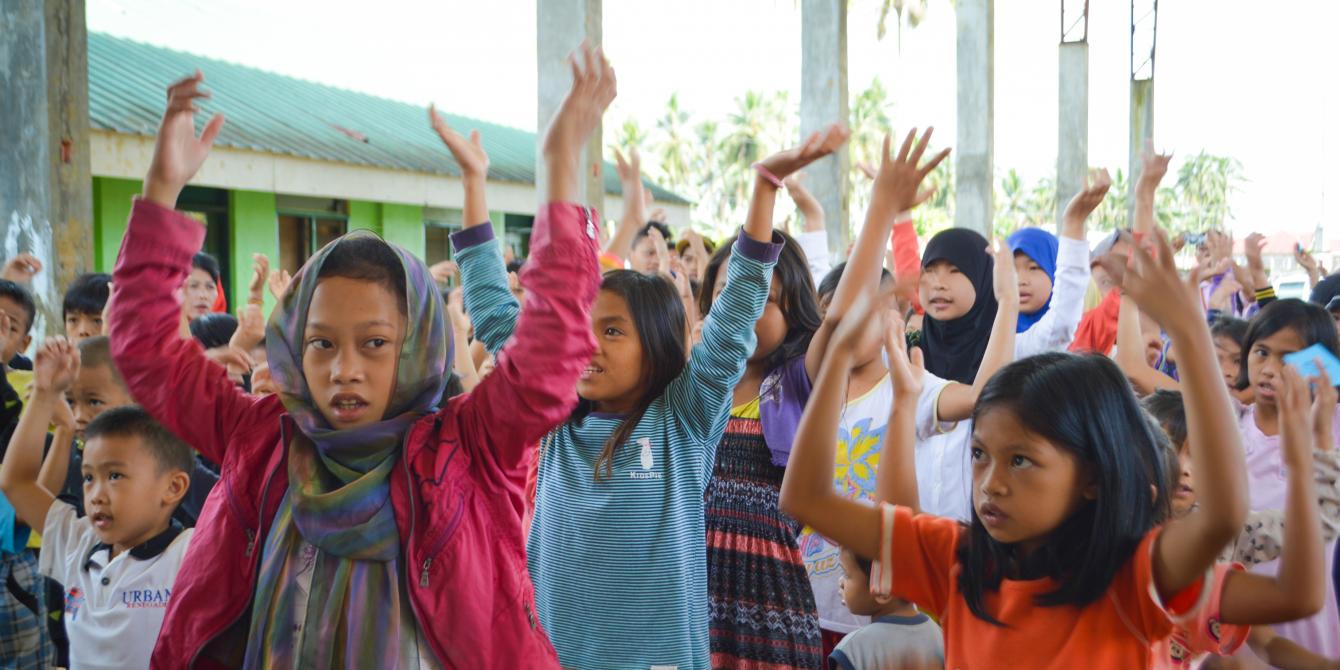
Displaced children of the Marawi siege participate in a psychosocial debriefing session in Saguiaran, Lanao del Norte (Photo: Angela Casauay/Oxfam)
Building peace in a culture of nonviolence
Kalilintad, kapamagogopa, katahimikan, peace. When internally displaced persons (IDPs) from Marawi City examined their notions of peace, they had many words for it, but seeing that they are in evacuation centers instead of their home city gave away the truth that peace is elusive in Mindanao.
Around 27,000 IDPs in evacuation centers are into their fourth month of temporary stay after they fled Marawi City to escape the firefight between government troops and ISIS-inspired extremists who took the city on May 23, 2017. As the government is trying to retake the city, Maranao IDPs are finding it more difficult to stabilize, especially those wanting to start anew with jobs and livelihoods.
Their religious and cultural identities often get in the way. "We are further harmed by the reality that Maranaos and all Muslims or Moros do not have the same opportunities as the rest of Filipinos," said Raakin Usma*, an IDP staying in the Landa Pamana evacuation site in Balo-i, Lanao del Sur, who held a stable job until the siege in Marawi City.
"If you're a Maranao, it's worse. Some of my friends lost their jobs. Those trying to get jobs are rejected because they are identified with Marawi and all negative things associated with the conflict," he said.
Raakin claims that the altered situation in Marawi caused by violence and extremism further aggravates their experiences of injustice. This was noted in early August during a forum of civil society organizations responding to the Marawi conflict that cited Maranaos finding it difficult to book places to rent and schools to send their children to simply because of bias and prejudice.
The issues raised include the practice of exclusion and discrimination due to patronage politics, no rule of law to address unresolved ridos or clan feuds, lack of recognition of the local culture including a political system that is not culturally-appropriate, failure to provide alternatives to poverty, which is an entry point for exposure to extremist ideologies, and militarization that develops further the culture of violence.
Foremost among the issues was the failure of the government to enact the Bangsamoro Basic Law (BBL) that would have initiated pathways to self-governance and peace in the Bangsamoro region.
Raakin was one of 30 IDP volunteers who took part in the Early Warning Early Response training conducted by Oxfam partner United Youth of the Philippines-Women (UnYPHIL-Women) with the Nisa Ul-Haqq Fi Bangsamoro (Women for Truth and Justice in the Bangsamoro) and Nonviolent Peaceforce Philippines (NFP) that taught Islamic peace building anchored on the teaching that Islam is a religion of peace, IDP rights under the UN Guiding Principles on Internal Displacement (UNGPID) and the Moro peace process that discussed prospects for peace under the BBL.
It was the second such training with Oxfam partners that aims to train communities to be able to know how to protect themselves and to resolve conflicts. It complements Oxfam partners' activities on psychosocial healing sessions, promoting peace among IDPs in evacuation camps and involving local organizations as partners in rebuilding Marawi by recognizing traditional mechanisms of conflict resolution.
Fatima Pir Allian, program manager of Nisa who discussed UNGPID and the peace process during the training, said "the voices of IDPs affirming their understanding of peace is an assurance that it can be attained through the process of expressing their aspirations" even under a situation of martial law until the end of this year.
Noraida Abo, executive director of UnYPHIL-Women, lamented the wasted chance of what could have been the enactment of the BBL, which she sees as the strongest factor to end conflict.
"Tanaw na tanaw na natin. (We could already see) the light at the end of the tunnel," she said of the draft BBL that was discussed initially but was not passed in Congress. She said the elusive peace would have been a dash away and would have begun to end the long history of discrimination and the protracted struggles to end conflict in Mindanao.
"Yung sisirain ng syudad na Bangsamoro ng kapwa niya Bangsamoro – hindi Islamic ang ganitong pamamaraan. (Taking over a city of fellow Bangsamoros is not Islamic). This is what we want to impart to young and old Bangsamoros who want peace," she said.
Allian said mainstreaming peace education not just in schools but in all spheres of discussion would be helpful to change the uniform but wrong perception of non-Moros about Moros and their practice of Islam.
As Raakin, the IDP who still hopes that perceptions and views would change, would say of the difficult path to peace, "May katapusan din pero mahaba ang proseso (There is an end to this but the process is long)."
Abo of UnYPHIL said one concrete way is to "let the Bangsamoros make their own decisions – peacefully."
*Real name withheld.

 Follow us on Facebook
Follow us on Facebook Instagram
Instagram Follow us on Twitter
Follow us on Twitter LinkedIn
LinkedIn